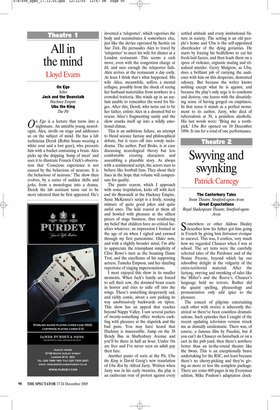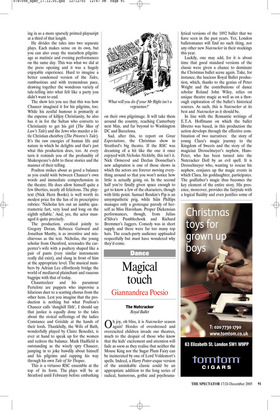Swyving and swynking
Patrick Carnegy
The Canterbury Tales Swan Theatre, Stratford-upon-Avon Great Expectations Royal Shakespeare Theatre, Stratford-uponAvon Somewhere or other Aldous Huxley describes how his father got him going in French by giving him littérature érotique to unravel. This was, I confess, very much how we regarded Chaucer when I was at school. The set texts were the carefully selected tales of the Pardoner and of the Nonne Preeste, beyond which lay our schoolboy delight in the vulgarity of the extra-territorial material. After the fartyng, swyving and swynking of tales like the Miller’s and the Reeve’s, Chaucer’s language held no terrors. Rather did the quaint spelling, phraseology and pronunciation only add spice to the pleasure.
The conceit of pilgrims entertaining each other with stories is inherently theatrical so there’ve been countless dramatisations. Such episodes that I caught of the recent updating television version struck me as dismally unidiomatic. There was, of course, a famous film by Pasolini, but if you can’t do Chaucer on horseback or on a cart in the pub yard, then there’s nowhere better than an in-the-round theatre like the Swan. This is an exceptionally brave undertaking for the RSC, not least because there’s no cherry-picking and they’re giving us more or less the complete package. There are some 600 pages in my Everyman edition, Mike Poulton’s adaptation clock ing in as a more sparsely printed playscript at a third of that length.
He divides the tales into two separate plays. Each makes sense on its own, but you can also essay the marathon pilgrimage as matinée and evening performances on the same day. This was what we did at the press opening and it was a hugely enjoyable experience. Hard to imagine a better condensed version of the Tales, rumbustious and with tremendous pace, drawing together the wondrous variety of tale-telling into what felt like a party you didn’t want to end.
The show lets you see that this was how Chaucer imagined it for his pilgrims, too. While his zestful humour is primarily at the expense of killjoy Christianity, he also has it in for the Sultan who converts to Christianity to get his girl (The Man of Law’s Tale) and the Jews who murder a little Christian choirboy (The Prioress’s Tale). It’s the raw energies of human life and nature in which he delights and that’s just what this production does, too. At every turn it reminds you of the profundity of Shakespeare’s debt to these stories and the manner of their telling.
Poulton strikes about as good a balance as you could wish between Chaucer’s own words and immediate comprehension in the theatre. He does allow himself quite a few liberties, nearly all felicitous. The playtext (Nick Hern Books) is well worth its modest price for the fun of its prescriptive rubrics: ‘Nicholas lets out an iambic quatrametric fart, very loud and long on the eighth syllable.’ And, yes, the actor managed it quite precisely.
The production, credited jointly to Gregory Doran, Rebecca Gatward and Jonathan Munby, is as inventive and mischievous as the text. Nicholas, the young scholar from Oxenford, serenades the carpenter’s wife with a psaltery shaped like a pair of pants (very similar instruments really did exist), and slung in front of him at the appropriate level. The musical numbers by Adrian Lee effortlessly bridge the world of mediaeval plainchant and raucous bagpipe with that of today.
Chauntecleer and his paramour Pertelote are puppets who improvise a hilarious duet to a scatting chorus from the other hens. Lest you imagine that the production is nothing but what Poulton’s Chaucer calls ‘dunghill filth’, I should say that justice is equally done to the tales about the stoical sufferings of the ladies Constance and Grisilde at the hands of their lords. Thankfully, the Wife of Bath, wonderfully played by Claire Benedict, is ever at hand to speak up for the women and redress the balance. Mark Hadfield is outstanding as the wisely spry Chaucer, jumping in to joke bawdily about himself and his pilgrims and rapping his way through his own Tale of Sir Thopas.
This is a virtuoso RSC ensemble at the top of its form. The plays will be at Stratford until February before embarking on their own pilgrimage. It will take them around the country, reaching Canterbury next May, and far beyond to Washington DC and Barcelona.
Sad, after this, to report on Great Expectations, the Christmas show in Stratford’s big theatre. If the RSC was dreaming of a hit like the one it once enjoyed with Nicholas Nickleby, this isn’t it. Nick Ormerod and Declan Donnellan’s new adaptation is one of those shows in which the actors are forever moving everything around so that you won’t notice how little is actually going on. In the second half you’re finally given space enough to get to know a few of the characters, though with little point. Samuel Roukin’s Pip is an unsympathetic prig, while Siân Phillips manages only a grotesque parody of herself as Miss Havisham. Proper Dickensian performances, though, from Julius d’Silva’s Pumblechook and Richard Bremmer’s Jaggers. Comedy was in short supply and there were far too many top hats. The coach-party audience applauded respectfully but must have wondered why they’d come.



















































































 Previous page
Previous page